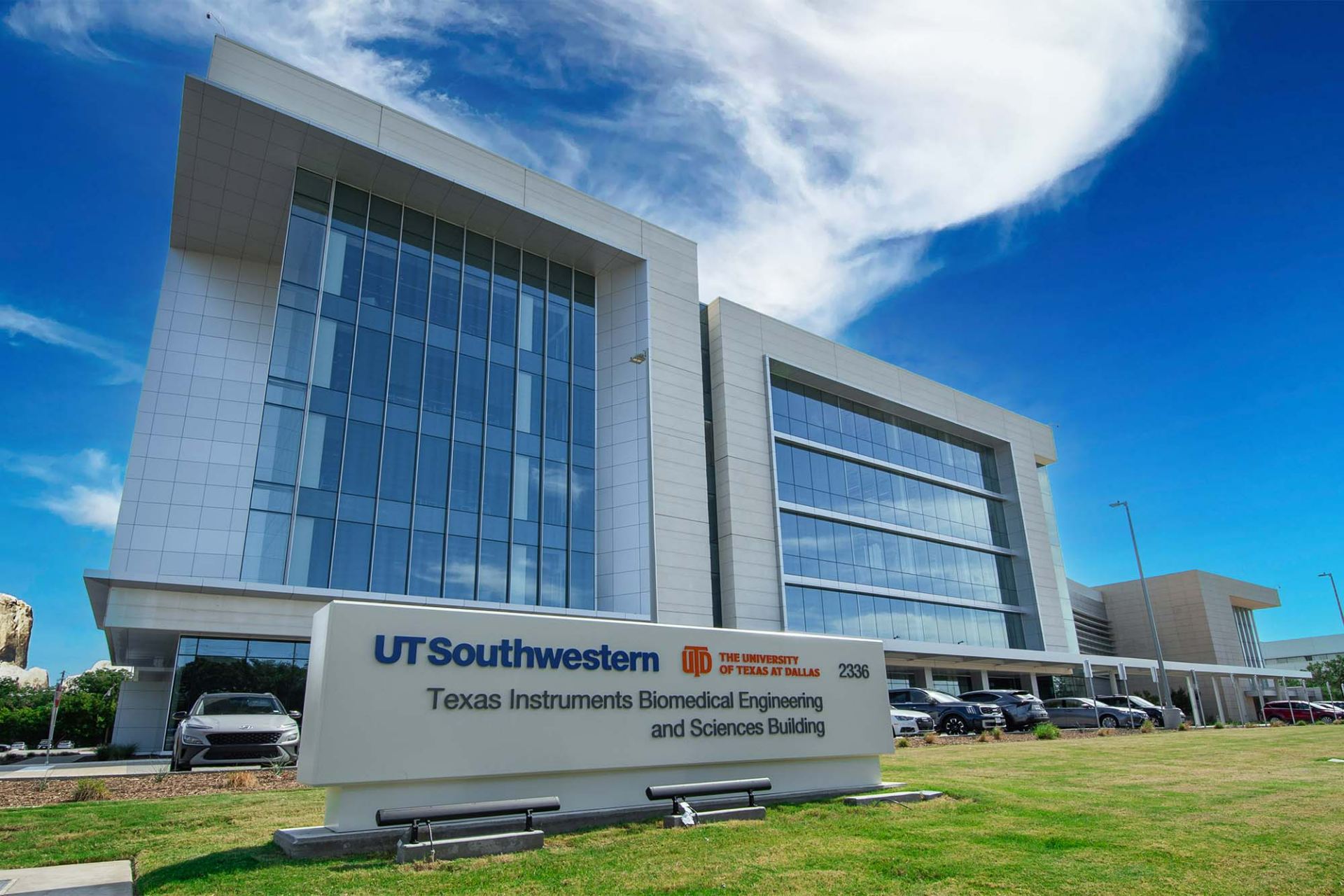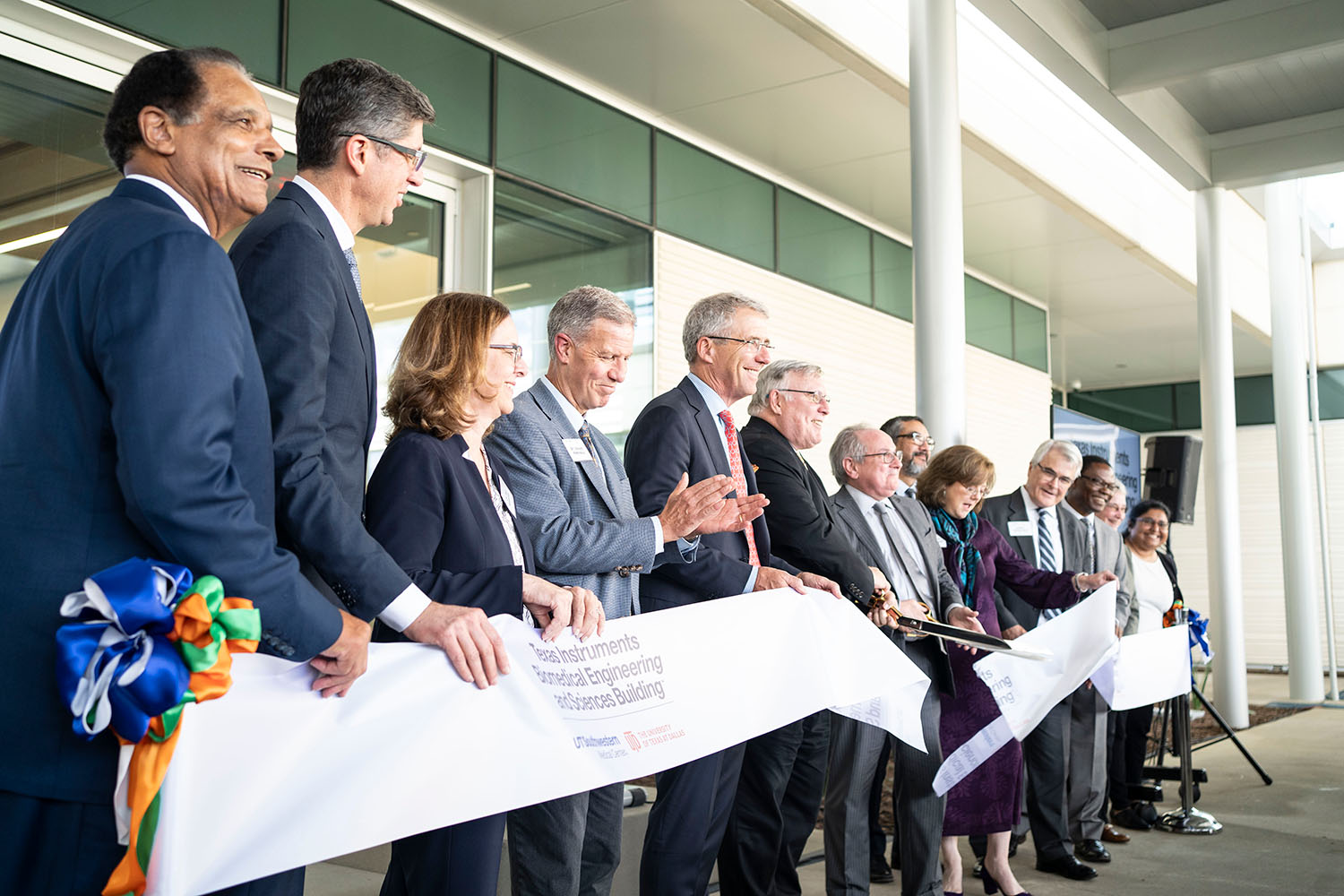UTD, UTSW Dedicate TI Biomedical Engineering, Sciences Building
By: Office of Media Relations | Oct. 26, 2023

State, regional and business leaders joined researchers and students from UT Southwestern Medical Center and The University of Texas at Dallas on Oct. 26 for the dedication of the Texas Instruments Biomedical Engineering and Sciences Building, which will accelerate training for the next generation and foster medical innovations to improve patient care.
The $120 million, five-story, 150,000-square-foot building, located on the East Campus of UT Southwestern, is made possible by a transformative gift from Texas Instruments (TI) and support from other donors, as well as investment from the Permanent University Fund of the UT System. The facility will support the work of dozens of faculty and their teams with both wet and dry laboratory space, areas designated specifically to promote multidisciplinary interactions, and a Biodesign Center that will feature a large assembly/design studio, a metal fabrication shop and rooms for 3D printing.
“Today’s occasion underscores the tremendous power of collaboration among three iconic North Texas institutions — UT Southwestern, UT Dallas and Texas Instruments. The new Texas Instruments Biomedical Engineering and Sciences Building will advance the UT System, the Metroplex and Texas as a hub for biomedical innovation, supporting the integration of world-class engineering and health sciences to advance collaboration among physicians, engineers, students and researchers to improve health care for Texas and beyond,” said James B. Milliken, chancellor of the UT System, where he also holds the Lee Hage and Joseph D. Jamail Regents Chair in Higher Education Leadership.
UT Southwestern president Dr. Daniel K. Podolsky said, “As the momentum of biomedical innovation has continued to accelerate across Texas and especially the Dallas-Fort Worth region, the need for facilities that can foster underlying research to produce solutions for unmet medical needs and train the next generation of innovators is critical.”
“Thanks to support from Texas Instruments, the Eugene McDermott Foundation, Lyda Hill Philanthropies and other generous donors, this new facility will cultivate a distinctive educational environment to advance transformational bioengineering that will improve patient care; facilitate advances in related fields, such as artificial intelligence, molecular imaging, robotics and genetic engineering; and further solidify North Texas as a hub for biomedical innovation,” said Podolsky, who holds the Philip O’Bryan Montgomery, Jr., M.D. Distinguished Presidential Chair in Academic Administration and the Doris and Bryan Wildenthal Distinguished Chair in Medical Science.
UT Dallas president Dr. Richard C. Benson, who holds the Eugene McDermott Distinguished University Chair of Leadership, said, “Biomedical engineering and science are major drivers of UT Dallas’ rapidly growing research portfolio. The already robust partnership between UT Dallas and UT Southwestern will take another huge step forward upon the launch of our shared facilities. This partnership will also provide students and faculty with more opportunities to create transformative technologies that will improve lives. We are grateful for the visionary support of Texas Instruments in this endeavor.”

Haviv Ilan, president and CEO of TI said, “We are proud to serve as a catalyst for the environment being dedicated today, where scientists, engineers and other innovators can find fresh solutions that will lead to new therapies, new drugs and new devices to help patients. I’m personally inspired by what a shared vision has led to — a center for life-improving innovations we can only begin to imagine.”
Others addressing the crowd of more than 100 students, professors and leaders during the ribbon-cutting included UT System Regent Christina Melton Crain; UT Dallas Provost Inga H. Musselman, vice president for academic affairs and the Cecil H. Green Distinguished Chair of Academic Leadership; and Dr. Samuel Achilefu, inaugural chair of biomedical engineering at UT Southwestern. Donors to the building also were recognized, including the Eugene McDermott Foundation, Lyda Hill Philanthropies, the Hillcrest Foundation, the David M. Crowley Foundation and other generous supporters.
Texas is among the top five states with the highest level of employment of bioengineers and biomedical engineers. Employment of those positions nationally is projected to grow 5% between 2022 and 2032, which is faster than the average for all occupations, according to the Bureau of Labor Statistics. About 1,200 openings for bioengineers and biomedical engineers are projected each year, on average, over that 10-year period, with the median annual wage for bioengineers and biomedical engineers at $99,550 in 2022. Additionally, medical technology industry revenues passed the notable milestone of a half-trillion dollars for the first time in 2021, with 10.7% of U.S. patents in 2022 in the medical technology field.
Recently, Pegasus Park, a neighboring Dallas development targeting biomedical innovation and entrepreneurs, was selected as home to the federal government’s Advanced Research Projects Agency for Health Customer Experience Hub, which will focus on developing accessible health solutions with the potential to be readily adopted. The project is considered a significant boost to the growing biotech and life sciences industries.
Since UT Dallas launched its Department of Bioengineering in the Erik Jonsson School of Engineering and Computer Science in 2010, the undergraduate program has become the third largest in the U.S. based on enrollment, according to the American Society for Engineering Education, and its graduate program is ranked fourth by U.S. News & World Report among biomedical engineering programs at Texas public universities, attracting students from around the world. In addition, support from TI, the UT System and the O’Donnell Foundation made it possible for UTD to establish the Texas Biomedical Device Center in 2012.
UT Southwestern’s Department of Biomedical Engineering, launched in 2021, is 50th (tie) in the nation among engineering school specialty rankings for biomedical engineering/bioengineering programs and listed fourth among Texas biomedical engineering programs by U.S. News & World Report Best Graduate School report. The medical center offers a PhD in biomedical engineering as part of its Graduate School of Biomedical Sciences, and an MD/PhD in medicine and biomedical engineering through its medical school and graduate school.
Media Contact: The Office of Communications and Marketing, or the Office of Media Relations, UT Dallas, (972) 883-2155, newscenter@utdallas.edu.





